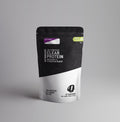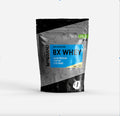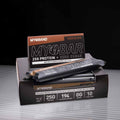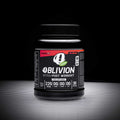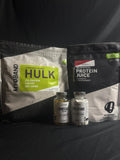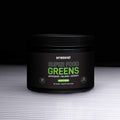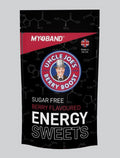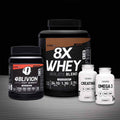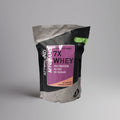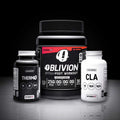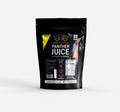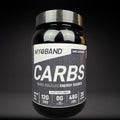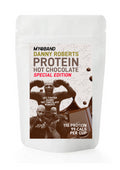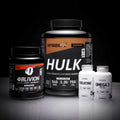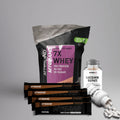Beginners guide to pre-workouts
Posted by PROPROTEIN LTD ADMIN

This sounds great, right? Well, pre-workout supplements have been known to have controversy in the health and fitness world. This guide includes all the benefits and drawbacks to pre-workouts that you need to be aware of before making an informed decision whether this supplement is right for you.
WHAT are pre-workouts?
If you haven’t already guessed, a pre-workout is a supplement used before an intense training session. As energy demands during exercise increase, energy supply decreases. Think of a pre-workout as a cocktail of several different ingredients, each assisting to recharge energy sources to help increase strength and lean body mass, subsequently increasing performance (1). The ingredients contained within pre-workouts can also improve focus, stamina, and muscle recovery time. Other benefits include decreased fatigue during workouts will assist to meet your fitness goals.

Don’t get us wrong, you must still put in the physical effort to gain the results! Some may choose to use fat-burning pre-workouts for aesthetic purposes, whereas others utilise the supplement for its ergogenic (energy, performance and recovery enhancing) effects, allowing them to train more. Long story short, people use pre-workouts for several different reasons and they all have the same goal in mind: to improve overall performance.
The most common form of pre-workout supplements is a powder that you add water to and drink before working out. If that doesn’t sound easy enough for you, pre-workouts also come in other forms such as gummies, which can be eaten on the go.
KEY INGREDIENTS found in pre-workouts:
Store-bought pre-workouts will have varied doses of each ingredient, therefore having a slightly different impact on the body whilst exercising. Some ingredients best work to improve endurance performances, whereas others will better aid shorter, intense exercise. Here are 4 key ingredients to look out for when purchasing your pre-workouts, and what they can do for you.
CREATINE
Creatine is a popular supplement taken by athletes who strive for increased strength and muscle mass, as well as fast muscle recovery after exercise (2). The body can naturally produce this molecule and ingest it by consuming red meat and fish. Past studies have proven that supplementation which increases creatine concentration within the muscles, will improve overall performance (4). Creatine is a key aspect of the body’s energy production process, so there is no surprise that it can have such an impact on training and recharging the muscles (3).
Creatine loading (0.3g/kg/day for 4-5 consecutive days) is often recommended as one of the fastest ways to saturate your muscle creatine stores (19). Alternatively, a lot of new research suggests that loading isn’t essential, and just a “maintenance” dose of around 0.03g/kg/day will help you achieve the same benefits. Your pre-workout supplement is a convenient way to attain a performance-enhancing dose, at a time it will benefit you most.
CAFFEINE
Do you know that feeling a strong cup of coffee gives you in the morning? Well, that’s all thanks to its caffeine content.
Caffeine is a central nervous system stimulant that increases the amount of blood that reaches your muscles by dilating blood vessels. This will make it feel like you’re putting in less effort, to accomplish the same amount of work. Caffeine can increase metabolic rate, enhance endurance and muscle power, as well short term cognition (14, 5). Past research studied the effects of caffeine on reaction time and sustained attention (18). Participants who consumed 1-2 mg/kg of caffeine had decreased reaction time and increased accuracy on the Rapid Visual Information Processing (RVIP) tasks, used to measure sustained attention. So there is no wonder most of us are coffee lovers!
BETA-ALANINE
Beta-alanine is a type of amino acid that works to reduce neuromuscular fatigue. During exercise, glucose is broken down into lactic acid, producing Hydrogen ions. Taking 4-6g/day of beta-alanine for four weeks has proven to significantly increase muscle carnosine concentration, which ultimately helps to maintain a stable intracellular pH (7). The pH scale is used to measure how acidic or basic aqueous solutions are. The scale ranges from 0 to 14, whereby lower numbers are considered more acidic than the numbers closest to 14.
Although beta-alanine helps to better performances that are 1-4 minutes long, this supplement does not have a significant effect on performances lasting less than 60 seconds (6). At this time, there would likely be
insufficient accumulation of Hydrogen ions to be the main cause of fatigue.
CITRULLINE
Citrulline is another type of amino acid that improves blood circulation in the body. Consuming 6g/day of l-citrulline will increase the amount of oxygen that is transported to your working muscles during exercise, allowing for an increased performance time before fatigue (8). Citrulline has also shown to reduce delayed onset muscle soreness, so you can get back to the gym quicker after intense training sessions.
WHEN should I take pre-workouts?
It is always a good idea to follow the directions for use on your specific pre-workout supplement label, but generally, it works best when taken 30-60 minutes before training (10). This allows enough time for the beneficial supplements to enter the bloodstream. For longer duration exercise, some recommend that pre-workout should be taken up to 60 minutes into the performance to provide a boost that will keep you going.

When used excessively, the body can become immune to the effects of pre-workouts. To avoid this, you can cycle the use of your pre-workouts by taking time o the supplements. Your body will subconsciously reset to its normal levels, so you can experience the full benefits of a pre-workout when you next take it. Alternatively, you could save the use of pre-workouts for especially tough training sessions or for those days when you just need a little pick me up.
WHY use pre-workouts?
Exercise-induced muscle soreness is the result of rupture and inflammation of the muscle, connective tissue, or nervous tissue due to microscopic tears within the fibres caused by high-intensity workouts (17). The symptoms of delayed onset muscle soreness (DOMS) can prolong the time it takes for you to be able to exercise again. Using supplements such as pre-workouts can decrease the time taken for muscle recovery, allowing you to get back to the gym sooner.
Pre-workouts are designed to help people train harder for longer periods. During high-intensity exercise, a pre-workout has proven to increase blood flow within the muscles (16). Previous research found that cyclists who took citrulline were able to bike for 12% longer than others not taking supplements (8). The caffeine content of pre-workouts has a positive impact on arousal and concentration, therefore enhancing cognition and allowing for increased focus during training sessions (11).
If you’re too tired and sore to go to the gym or want to increase your exercise capacity, consistently taking pre-workouts can give you the ergogenic aid needed to be able to perform, without overloading on carbs and calories.
WHO should take pre-workouts?
Pre-workouts are not suitable for children or people who only train occasionally at the gym. Realistically, no one needs to take pre-workouts. Fitness goals can still be met without the use of supplements. However, this isn’t to say they are not useful to certain people. Stimulant heavy supplements should only be considered after a serious training program is set in place, and the athlete has the motivation needed to achieve the desired results. Pre-workouts are made to help athletes, bodybuilders and gym junkies get through heavy, intense training sessions and break personal records.
Optimal performance can only be reached when the correct training is combined with adequate nutrition. Therefore, the benefits of a pre-workout will be best noticed over time when paired with regular training, sufficient nutrition, and plenty of rest.
ATHLETES using pre-workouts:
The ergogenic benefits of pre-workouts will help individuals train harder and fatigue later, meaning more time can be spent improving overall performance. So, no matter what the sport is, athletes who are serious about training will likely benefit from pre-workout supplements.
However, the world anti-doping agency (aka WADA) does not ‘approve’ products or supplements and therefore, no pre-workout supplement is considered ‘WADA safe’. Instead, WADA releases lists of banned substances that are prohibited at specific times (ie., banned from competitions, particular sports or always). If you are an athlete thinking about trying a pre-workout, take careful notice of the ingredients because there is a chance that it will contain substances that are banned by WADA. The common ingredients found in pre-workouts discussed previously (creatine, caffeine, beta-alanine and citrulline) are not included on the 2021 WADA prohibited list. Caffeine is one of the exceptions for the prohibited specified stimulants listed.
BENEFITS of taking pre-workouts:
Research suggests that ingredients found in pre-workouts (including the 4 discussed previously) can create a synergistic effect when used together (1). This means greater benefits will arise when the supplements are combined rather than used separately. Pre-workouts have relatively immediate effects on the body, which is especially useful for athletes with busy lifestyles.
Key ingredients such as caffeine will reach peak levels in the bloodstream within the first 30-60 minutes of consumption (10). The effects of a pre-workout generally last between 3-6 hours, dependent on the product.
A randomised, placebo-controlled study was conducted over 3 weeks to investigate the effects of a pre-workout supplement combined with high-intensity interval training (15). Aerobic and anaerobic running performance, training volume, and body composition were analysed throughout the study. Results showed VO2max improved for both the pre-workout supplement and placebo group (10.3% and 2.9% respectively). On average, the lean body mass for the group taking a pre-workout increased 1.2kg, whereas the placebo LBM decreased 0.5kg (15).
POTENTIAL DRAWBACKS of taking pre-workouts:
Typically, pre-workout supplements will contain artificial sweetener or sugar alcohol to help improve the flavour without overloading on calories. Although this seems like a good thing, these ingredients can lead to some unwanted side effects which may affect your training. Consuming large quantities of sugar alcohols has proven to cause bloating, gas and diarrhoea (12).
The energy boost felt after taking a pre-workout mainly comes from the caffeine content. Many people also consume caffeine daily through other sources such as tea and coffee. This becomes slightly worrying when taking pre-workouts as well because high doses of caffeine over a long period can cause adverse effects such as anxiety, high blood pressure and diarrhoea (9).
Some ingredients such as beta-alanine may cause paraesthesia, more commonly known as pins and needles. Although paraesthesia is not dangerous to the body, it may become uncomfortable during a workout.
TAKE HOME MESSAGE
The controversy with pre-workout supplements still stands. Although pre-workouts can give you the energy boost needed to get through longer, more intense workouts to help improve your exercise performance. They can also lead to unwanted side-effects which impact your ability to train.
That being said, a pre-workout is no miracle worker and will not show the benefits alone. A balanced diet, along with excellent hydration and correct timing of meals is just the beginning to enhancing your exercise performance. Pre-workout supplements can be used as the ‘cherry on top’ to maximise your performance and muscle recovery.
As a newbie testing out pre-workouts, it might be a good idea to start o with half dosages, slowly increasing the concentration, to prevent any undesirable side effects. This way, you will be able to track exactly how much your body can tolerate without disrupting your training in the process. If your chosen pre-workout supplement contains caffeine, keep in mind when you last drank tea or coffee to avoid possible unwanted effects. Currently, guidelines show that consumption of up to 350mg of caffeine is considered to be safe, where a cup of coffee can contain up to 40mg. Furthermore, refrain from consuming caffeine for at least 6 hours before bed to decrease the likelihood of disrupted sleep (13).
To sum it up, pre-workout supplements are not necessary, however, they can aid exercise performances and provide energy boosts. Whether you choose to use pre-workouts or not, always do your research on supplements that you put in your body to reap the full benefits!
Author: Kate Searl
References:
(1) Kaczka, P., Batra, A., Kubicka, K., Maciejczyk, M., Rzeszutko-Bełzowska, A., Pezdan-Śliż, I., Michałowska-Sawczyn, M., Przydział, M., Płonka, A., Cięszczyk, P., Humińska-Lisowska, K., & Zając, T. (2020). Eects of pre-workout multi-ingredient supplement on anaerobic performance: Randomized double-blind crossover study. International Journal of Environmental Research and Public Health, 17(21), 8262. https://doi.org/10.3390/ijerph17218262
(2) Kreider, R. B., Kalman, D. S., Antonio, J., Ziegenfuss, T. N., Wildman, R., Collins, R., Candow, D. G., Kleiner, S. M., Almada, A. L., & Lopez, H. L. (2017). International society of sports nutrition position stand: Safety and ecacy of creatine supplementation in exercise, sport, and medicine. Journal of the International Society of Sports Nutrition, 14(1), 18-18. https://doi.org/10.1186/s12970-017-0173-z
(3) Strumia, E., Pelliccia, F., & D’Ambrosio, G. (2012). Creatine phosphate: Pharmacological and clinical perspectives. Advances in Therapy, 29(2), 99-123. https://doi.org/10.1007/s12325-011-0091-4
(4) Rawson, E. S., & Volek, J. S. (2003). Eects of creatine supplementation and resistance training on muscle strength and weightlifting performance. Journal of Strength and Conditioning Research, 17(4), 822.
(5) Del Coso, J., Salinero, J. J., González-Millán, C., Abián-Vicén, J., & Pérez-González, B. (2012). Dose response eects of a caeine-containing energy drink on muscle performance: A repeated measures design. Journal of the International Society of Sports Nutrition, 9(1), 21-21. https://doi.org/10.1186/1550-2783-9-21
(6) Hobson, R. M., Saunders, B., Ball, G., Harris, R. C., & Sale, C. (2012). Eects of β-alanine supplementation on exercise performance: A meta-analysis. Amino Acids, 43(1), 25-37. https://doi.org/10.1007/s00726-011-1200-z
(7) Trexler, E. T., Smith-Ryan, A. E., Stout, J. R., Homan, J. R., Wilborn, C. D., Sale, C., Kreider, R. B., Jäger, R., Earnest, C. P., Bannock, L., Campbell, B., Kalman, D., Ziegenfuss, T. N., & Antonio, J. (2015). International society of sports nutrition position stand: Beta-alanine. Journal of the International Society of Sports Nutrition, 12(1), 30-30. https://doi.org/10.1186/s12970-015-0090-y
(8) Bailey, S. J., Blackwell, J. R., Lord, T., Vanhatalo, A., Winyard, P. G., & Jones, A. M. (2015). l-citrulline supplementation improves O2 uptake kinetics and high-intensity exercise performance in humans. Journal of Applied Physiology (1985), 119(4), 385-395. https://doi.org/10.1152/japplphysiol.00192.2014
(9) Sellami, M., Slimeni, O., Pokrywka, A., Kuvačić, G., D Hayes, L., Milic, M., & Padulo, J. (2018). Herbal medicine for sports: A review. Journal of the International Society of Sports Nutrition, 15(1), 14-14. https://doi.org/10.1186/s12970-018-0218-y
(10) Harty, P. S., Zabriskie, H. A., Erickson, J. L., Molling, P. E., Kerksick, C. M., & Jagim, A. R. (2018). Multi-ingredient pre-workout supplements, safety implications, and performance
outcomes: A brief review. Journal of the International Society of Sports Nutrition, 15(1), 41-41. https://doi.org/10.1186/s12970-018-0247-6
(11) Nehlig, A. (2010). Is caeine a cognitive enhancer? Journal of Alzheimer's Disease, 20 Suppl 1, S85.
(12) Mäkinen, K. K. (2016). Gastrointestinal disturbances associated with the consumption of sugar alcohols with special consideration of xylitol: Scientific review and instructions for dentists and other health-care professionals. International Journal of Dentistry, 2016, 5967907-16. https://doi.org/10.1155/2016/5967907
(13) Drake, C., Roehrs, T., Shambroom, J., & Roth, T. (2013). Caeine eects on sleep taken 0, 3, or 6 hours before going to bed. Journal of Clinical Sleep Medicine, 9(11), 1195-1200. https://doi.org/10.5664/jcsm.3170
(14) Koot, P., & Deurenberg, P. (1995). Comparison of changes in energy expenditure and body temperatures after caeine consumption. Annals of Nutrition and Metabolism, 39(3), 135.
(15) Smith, A. E., Fukuda, D. H., Kendall, K. L., & Stout, J. R. (2010). The eects of a pre-workout supplement containing caeine, creatine, and amino acids during three weeks of high-intensity exercise on aerobic and anaerobic performance. Journal of the International Society of Sports Nutrition, 7, 10-10. https://doi.org/10.1186/1550-2783-7-10
(16) Martin JS, Mumford PW, Haun CT, et al. Eects of a pre-workout supplement on hyperemia following leg extension resistance exercise to failure with dierent resistance loads. J Int Soc Sports Nutr. 2017;14:38. doi:10.1186/s12970-017-0195-6
(17) Hough T (1900) Ergographic studies in muscular fatigue and soreness. J Boston Soc Med Sci 5:81–92
(18) Yeomans, M. R., Ripley, T., Davies, L. H., Rusted, J., & Rogers, P. J. (2002). Eects of caeine on performance and mood depend on the level of caeine abstinence. Psychopharmacology, 164(3), 241-249. https://doi.org/10.1007/s00213-002-1204-1
(19) Cooper, R., Naclerio, F., Allgrove, J., & Jimenez, A. (2012). Creatine supplementation with specific view to exercise/sports performance: An update. Journal of the International Society of Sports Nutrition, 9(1), 33-33. https://doi.org/10.1186/1550-2783-9-33
TAGS:
